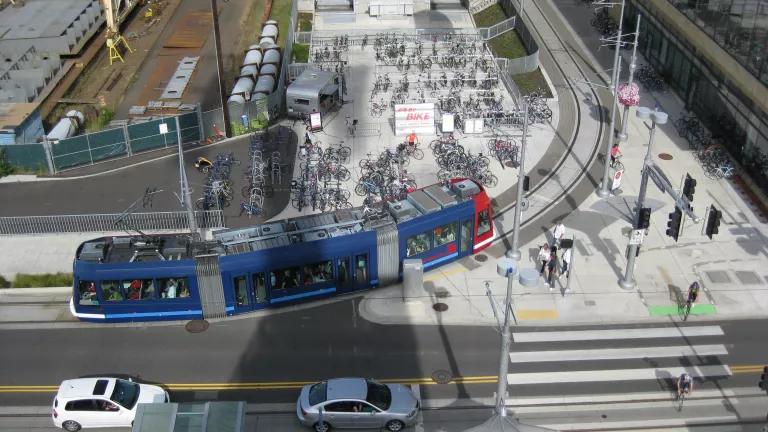A Pivotal Moment for Sustainable Transportation
The billions of taxpayer dollars we spend on transportation infrastructure can repair the damage caused by decades of racism, pollution, and inequity, or they can dig us deeper.

The future of transportation needs to be safe, equitable and sustainable.
What our country chooses to invest in says a lot about who we are and where we're going. The push for racial justice and the COVID-19 pandemic have intersected and revealed systemic inequity, unsustainability and calls for long-overdue solutions. That makes now a crucial time to invest in our infrastructure.
Consider this moment: The House passed a sweeping infrastructure package, The Moving Forward Act, including the INVEST in America Act. This bill lays out a vision of transportation policy for the next five years. It’s a shift from previous surface transportation reauthorization bills and marks significant milestones in the progress towards a more sustainable and equitable transportation future.
While the Moving Forward and INVEST Acts were considered, the House Select Committee on the Climate Crisis also released, "Solving the Climate Crisis," a report detailing how to address the devastating effects of climate change.
As this major investment is being considered, a cultural and economic shift is underway across the nation as well.
- The unemployment rate stands at 13.3 percent.
- Many states are reporting alarming increases in COVID-19 cases.
- People in more than 2,000 cities, in all 50 states, have taken to the streets to protest for racial equality and criminal justice reform in the aftermath of the murder of George Floyd.
All these crises call out for change, equity, and sustainability, and we have the opportunity to extend that mandate to our transportation system.
Most of the last century of infrastructure spending has been dominated by highway construction. Spurred in part by lobbying from the oil industry, our highway system served to connect the growing United States in the 1950s and 1960s. These highways also served to advance segregation as they literally divided communities. Construction of highway connectors into urban centers was used as a pretext to demolish dozens of majority Black neighborhoods. At the same time, investments in car-only highways came at the direct expense of transit systems. Dense networks of streetcars and, later, buses once connected city residents of all races and incomes with the jobs and services they needed. As white and wealthy people bought cars and moved to the suburbs, they persuaded their elected leaders to cut funding for transit and build highways instead, leaving behind millions of people who couldn't afford to buy a car.
The COVID-19 pandemic offers another example of the importance of mobility. Black people in America are both more likely to rely on transit than their white counterparts and more likely to die from COVID-19. Many transit agencies across the country have responded to a collapse in revenues during the pandemic by slashing service, making it difficult for riders to get to the doctor, pharmacies, and essential services.
As the Select Committee on the Climate Crisis has pointed out, these problems are, only compounded by climate change, and the choices we make in our transportation in turn can make climate change worse. Transportation is the primary source of the United States’ greenhouse gas emissions and transportation pollution is only expected to grow unless significant changes are made to how we get around.
Now more than ever, it is imperative our government design transportation policy that rises to the moment. The billions of taxpayer dollars we spend on infrastructure can repair the damage caused by decades of racism, pollution, and inequity, or they can dig us deeper.
The INVEST Act offers this new pathway forward with a significant investment in climate mitigation, resilience, and long-overdue reforms that focuses on the needs of communities.
While there may be disagreements in Washington about the best way to solve our infrastructure challenges, there is consensus behind the existence and urgency to act and pass a long-term transportation bill. We are poised to do this with the INVEST Act.
Unfortunately, House Republicans on the Transportation and Infrastructure Committee unveiled a counter plan, introduced as the STARTER Act. It’s a continuation of the status quo. It maintains existing, insufficient funding for the next five years, and includes provisions that will harm our health and public safety, and threatens the sustainability of both our transportation and climate future.
Specifically, where the INVEST Act supports communities and takes action to fight climate change, the STARTER Act fails. It:
- Undermines bedrock protections for clean air and water. STARTER contains a number of insidious provisions that will undermine the rights of the public guaranteed by NEPA, the National Environmental Policy Act. The bill attempts to undercut the ability of the public and scientists to provide input on large infrastructure projects by forcing agencies to rush their analyses and imposing arbitrary page limits to censor their findings.
- Fails to confront the climate crisis. The STARTER Act fails to recognize the danger of transportation carbon emissions and makes no attempt at a remedy. The only mention of a "climate solution" is a requirement that the Department of Transportation charge a fee to drivers of electric vehicles. Some opponents of climate action have blamed shortfalls in the highway trust fund on the fact that electric vehicles don't use gas, and thus don't pay into a gas tax. However, taxing drivers who make the responsible choice to drive an electric vehicle won't come close to closing the funding gap in the highway trust fund and will only weaken an important and growing clean job creator—the EV market.
- Prioritizes highways over low-carbon transportation modes. Most of the new funding authorized by STARTER is directed to outdated modes of travel and methods of planning. Instead of recklessly funding the continued expansion of the highway system, it is imperative that the federal government focus on maintenance of existing roads and construction of low-carbon alternatives.
Which future would you support?
How well do the INVEST and STARTER Acts incorporate recommendations from the Climate Crisis Action Plan?
| INVEST Act | Climate Crisis Action Plan Recommendation | STARTER Act – Republican Alternative |
| Over $8 billion for carbon reduction, and includes incentives for community-led innovation, like first and last mile transit connections, public EV chargers, and protected bike lanes | Reduce carbon pollution | $0 in funding, and no new programs or incentives |
| Over $6 billion for climate resiliency, and incorporates standards across all programs, including highway formula funding and long term state and regional transportation plans. | Invest in climate resiliency | A narrow, under-funded program that does not directly account for climate impacts |
| Invests in: Regional Rail - $60 billion; Transit - over $100 billion, Electric Vehicle Charging Infrastructure - over $2 billion | Promote Low-Carbon Modes | No significant increase in funding but creates a new tax on electric vehicles |
| Establishes an Office of Transit-Supportive Communities to better serve and support underserved communities, and $20 million in grant funding | Incentivize affordable housing near transit | Allows states to raid funds set aside for underserved communities and spend that money on boondoggles |
| Increases funding to air quality programs, that monitor, report, and aim to improve air quality, particularly in communities with the highest levels of pollution | Protect clean air | Undermines bedrock environmental laws, like the National Environmental Policy Act, and censors scientific and public input that would help improve air quality standards |
| Allows states and cities to implement Vision Zero plans, which work to strategically reduce deaths and injuries of pedestrians, cyclists, and other vulnerable road users | Protect communities | Makes no mention of protecting vulnerable road users |



